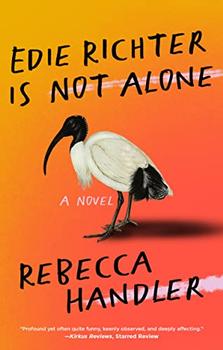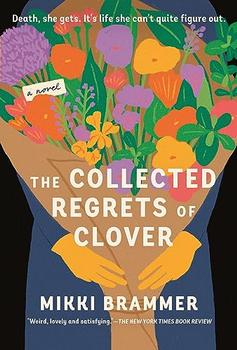Summary | Excerpt | Reviews | Beyond the book | Read-Alikes | Genres & Themes | Author Bio

Edie Richter is living in Boston with her husband, Oren, when her father is diagnosed with Alzheimer's. Edie and Oren uproot their lives to move to San Francisco where she can be closer to her family, and she suffers considerable emotional strain as her father slowly loses his physical and mental faculties. "I knew Dad would stop recognizing me. I didn't know I would stop recognizing him," she confesses.
After watching his steady decline for months, Edie puts a t-shirt over her father's mouth and suffocates him.
Though it seems like the sort of detail that some authors might withhold until the end of a book for shock value, the reader is informed of this development in Chapter 3, in language unapologetic and clear as day: "Eventually Dad stopped eating. Not long after, I killed him." A short time later, Edie's husband receives a job offer that requires the couple to relocate to Perth, and this is where the majority of the novel takes place. Edie, a freelancer without a steady job, welcomes the opportunity to move thousands of miles away from home, hoping to be able to outrun the memory of what she's done. But once in Perth, she finds the opposite to be the case. Australian society and the outback landscape alike feel as though they're closing in on her while she struggles to reckon with the reality of having killed her father, even as she mourns for him.
Edie Richter Is Not Alone is an absorbing, sharp, acerbic book about guilt and loss, easy to read in a single sitting but with a lasting impact. Although it's light on plot, it's a difficult book to put down; Rebecca Handler so effortlessly immerses the reader in Edie's interior that the book feels both all-encompassing and intensely intimate. Her prose is assured and wry. A novel that begins with patricide hardly seems like it has any business being humorous, but Handler's deft wit is perfectly suited to Edie's inner monologue as she reflects on the absurdities of the situations she's struggling to navigate: learning to drive on the "wrong" side of the road, listening to possums scream all night long and feeling inexplicably dogged by a series of real estate billboards.
Alongside Edie's guilt about her father, she's also challenged by an imperfect marriage, though Oren is, by all accounts, a nearly perfect husband. Still, Edie doesn't confide in him about the murder she committed, and she continues to push him away at every turn. This dynamic serves to illuminate another of the book's chief themes: the fact that it's impossible to know the lengths we'd go to when pushed to extremes means it's impossible to truly know other people, even those closest to us. "We see ourselves one way, or many ways in relation to different people, I guess. But our identity, like who we are, who we really are, no one knows this. Some people say they are a certain way, identify a certain way, but it's all kind of bullshit," Edie says to a room full of strangers in a support group as she tries and fails to articulate how her sense of self shifted throughout her father's illness.
Edie Richter Is Not Alone is a provocative novel that simmers with tension as Edie fights against the strain of what she's done, persecuted by no one and nothing except her own thoughts. While it's disturbing in some respects, it's also brutally honest, and digs at the question of what it means to love and grieve and be human, while staunchly refusing to give any easy answers.
![]() This review was originally published in The BookBrowse Review in April 2021, and has been updated for the
October 2022 edition.
Click here to go to this issue.
This review was originally published in The BookBrowse Review in April 2021, and has been updated for the
October 2022 edition.
Click here to go to this issue.

If you liked Edie Richter is Not Alone, try these:

by Miranda July
Published 2025
The New York Times bestselling author returns with an irreverently sexy, tender, hilarious and surprising novel about a woman upending her life

The Collected Regrets of Clover
by Mikki Brammer
Published 2024
Mikki Brammer's The Collected Regrets of Clover is a big-hearted and life-affirming debut about a death doula who, in caring for others at the end of their life, has forgotten how to live her own, for readers of The Midnight Library.
Your guide toexceptional books
BookBrowse seeks out and recommends the best in contemporary fiction and nonfiction—books that not only engage and entertain but also deepen our understanding of ourselves and the world around us.